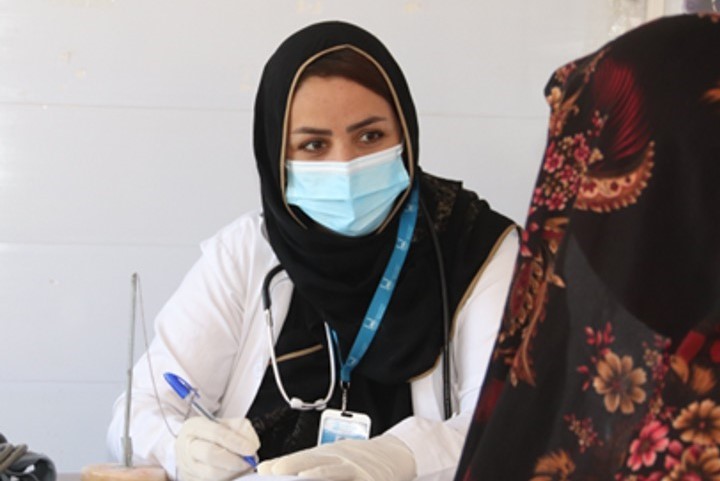
Every morning at 6 am, Dr Wahida and her colleagues embark on a 2-hour journey through Afghanistan’s rugged mountains. The roads are harsh, the terrain unforgiving and the delays inevitable, but the stakes are too high to turn back. At the end of their trek lies Botan clinic, a lifeline for the earthquake-stricken Gulran district.
Since the devastating earthquakes in October 2023, Dr Wahida has led the team at Botan, offering everything from maternal and child health services to treatment for infectious diseases.
Before Islamic Relief opened the clinic, villagers had to endure long and costly journeys to Herat city, an option few could afford.
Now, hundreds of families can access life-saving medical treatment close to home.
“I’m proud to be part of a team providing desperately needed healthcare,” says Wahida. “Without our support, the wellbeing of entire communities would be in jeopardy.”
Rebuilding community wellbeing
The 2023 earthquakes not only destroyed homes and infrastructure, but also shattered an already fragile healthcare system.
In direct response to this crisis, Islamic Relief established 3 clinics in Botan, Chehal Dukhtaran, and Hamamak to provide urgently needed medical services.
“These families have lost everything in the earthquakes, their homes, their livelihoods, and even loved ones. The trauma is deep. My work here is about more than physical health. It’s about restoring hope,” Wahida says.
Bringing healthcare to remote areas
Wahida’s story is just one among many. Kunar province is surrounded by steep mountains, with the mud-brick villages miles away from reliable health facilities. Women and children often travel for hours, sometimes on foot, for medical care.
A small group of dedicated women is determined to change this by bringing healthcare to the most remote areas.
One of them is Taslima, a 30-year-old midwife from Shino village. Her daily routine involves a dangerous 3-hour drive.
“Traveling to the clinic on unpaved, rocky roads in the mountains is challenging and physically demanding,” Taslima says. “The roads can be unsafe, and we often face issues like flat tires that delay us from getting to the clinic or returning home.”
Despite these dangers she visits the clinic every day, remedying conditions which previously went untreated, including malnutrition and anaemia.
Afghan women overcome broken promises of change
The theme of this year’s 16 Days of Activism Against Gender-Based Violence campaign, Broken Promises, is painfully relevant for Afghan women. For decades they have been promised progress, freedom and equality. These promises have been repeatedly shattered.
But women like Wahida and are refusing to let these setbacks define them. Working in a society where women’s rights have been consistently eroded, Wahida’s role is not only about healthcare, but also empowerment.
Her presence at the clinic symbolises a brighter future, one where Afghan women can work, heal and rebuild their communities despite the odds stacked against them.
Despite the broken promises to Afghan women, it is their determination and resilience that continue to drive change.
Please donate now to help Islamic Relief provide essential healthcare, restore hope and empower women like Dr Wahida to continue their vital work.



